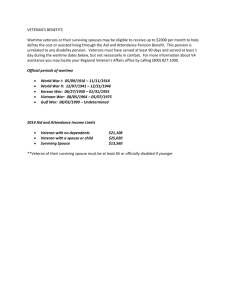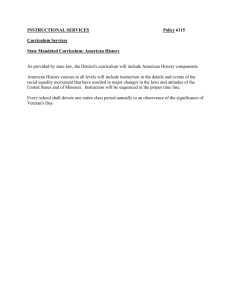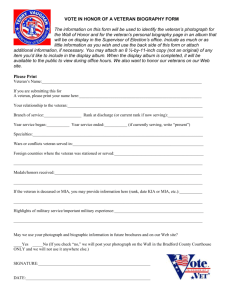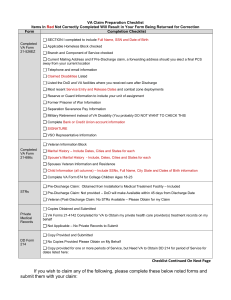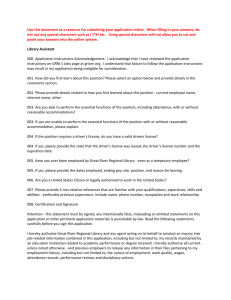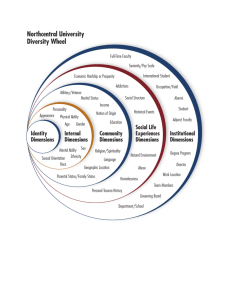to the Building the Interview Activity Pack
advertisement
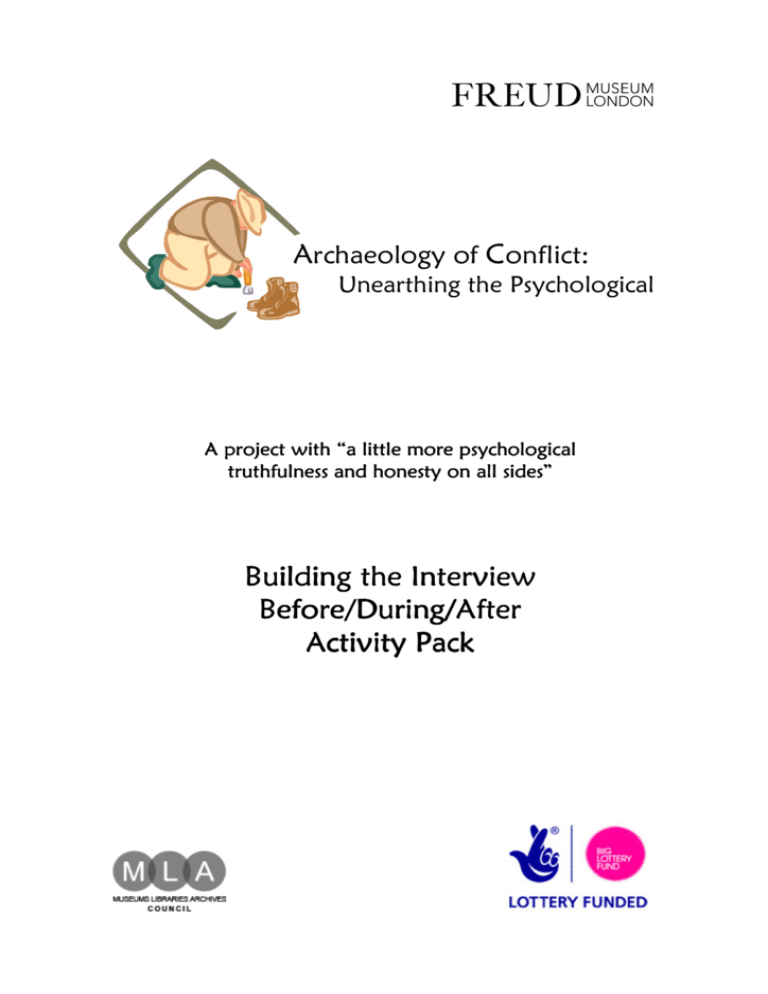
Archaeology of Conflict: Unearthing the Psychological A project with “a little more psychological truthfulness and honesty on all sides” Building the Interview Before/During/After Activity Pack Contents • Task Examples • Before • During • After • Discuss your Interview • Advert Alert Archaeology of Conflict TASK EXAMPLES Imaginary group example: BEFORE 1. What were your friendship-groups like at school? • Did you have a best friend? • What was she/he like? • Did you ever fall out? 2. What was life like when you were growing up? • What was daily family life like? 3. Growing up, did you know your grandparents? • What were they like? DURING 1. Did you make any good friends in the army? • What was your division like? • Was there a lot of rivalry or camaraderie? 2. What was daily life like in the army? 3. When you were in the army, did you AFTER 1. Have you still got strong friendships from school? • Are you still in contact with many members of your division? • Who is your closest friend now? • What is important to you in a friendship? 2. What do you do now? 3. How do you feel about young people? Question 1: Try to tap into the idea of friendship and group solidarity. Also looking for any interesting comments about similarities and differences, understanding and identification. If the veteran was for instance a social person but is now lonely, or if Activity Sheet Archaeology of Conflict similar friendship patterns have followed them through the different organisations (school, army, Combat Stress) that they have belonged to. Question 2: Examine the structure of the veteran’s daily life. Again I am looking for motifs or changes. Have they always had a structured and disciplined life? Question 3: This question is trying to explore the veteran’s sense of generational progression and intergenerational relations / expectations. Some other ideas for questions: • Recurring dreams from childhood • Hobbies • Fears • Authority • Expectations / disappointments • Respect • Surprises • Love • Hate • And there are many more……. Be thoughtful, be creative…. What you might do is tap into one of these in an unusual way. For example you might hear a veteran’s story about his pet dog when he was growing up and the close bond and the dog’s unexpected death. Then you could ask about feelings of… sadness, betrayal, anger, jealousy (a friend whose dog didn’t die) etc… Think about the effect of, for instance, how the parents handled the death. Then you might think about the effect this would have on the veteran’s expectations and feelings about loyalty and death throughout their life. Maybe they secretly felt responsible for the dog’s death? So you might try to look for similar stories or examine the other ‘close bonds’ in their life and how they maintained, feared, distanced or regarded these? Maybe a really close friend was lost in combat? Maybe that triggered old forgotten feelings? And maybe they now can’t form close bonds and feel a need to push people away from them….. • • • When you get a good thread it is worth really exploring it. Remember themes will often link together or a question might lead in an unexpected direction so you need to listen and be flexible in your questioning. If you don’t feel that a thread is going anywhere then you may want to dig for fresh material / ‘stuff’. Activity Sheet Archaeology of Conflict TASK BEFORE Think about a person’s memories prepre-conflict and how these might be formative and help us learn about how the person responded to later incidents ADD THREE POSTPOST-IT NOTES WITH SENSITIVE AND THOUGHT THROUGH QUESTIONS TO ENCOURAGE THEM TO TALK TALK TO YOU • • • • Think about the veteran’s life before the army. What kinds of questions might you ask to hear about the veteran’s early life? If you have already done during or after questions, try to link the subject of the question to the ones already done. Think about finding patterns and changes in the veteran’s psychology. Remember: • • • When you get a good thread it is worth really exploring it. Themes will often link together or a question might lead in an unexpected direction so you need to listen and be flexible in your questioning. If you don’t feel that a thread is going anywhere then you may want to dig for fresh material / ‘stuff’. Activity Sheet Archaeology of Conflict TASK During Think about a person’s memories of an incident of conflict ADD THREE POSTPOST-IT NOTES NOTES WITH SENSITIVE AND THOUGHT THROUGH QUESTIONS TO ENCOURAGE THEM TO TALK TO YOU • • • • Think about the veteran’s life during the army. What kinds of questions might you ask to hear about the veteran’s experiences in military service? If you have already done before or after questions, try to link the subject of the question to the ones already done. Think about finding patterns and changes in the veteran’s psychology. Remember: • • • When you get a good thread it is worth really exploring it. Themes will often link together or a question might lead in an unexpected direction so you need to listen and be flexible in your questioning. If you don’t feel that a thread is going anywhere then you may want to dig for fresh material / ‘stuff’. Activity Sheet Archaeology of Conflict TASK After Think about a person’s feelings and thought after conflict ADD THREE POSTPOST-IT NOTES NOTES WITH SENSITIVE AND THOUGHT THROUGH QUESTIONS TO ENCOURAGE THEM TO TALK TO YOU • • • • Think about the veteran’s life after the army. What kinds of questions might you ask to hear about the veteran’s life now? If you have already done before or during questions, try to link the subject of the question to the ones already done. Think about finding patterns and changes in the veteran’s psychology. Remember: • • • When you get a good thread it is worth really exploring it. Themes will often link together or a question might lead in an unexpected direction so you need to listen and be flexible in your questioning. If you don’t feel that a thread is going anywhere then you may want to dig for fresh material / ‘stuff’. Activity Sheet Archaeology of Conflict TASK Discuss Your Interview Take this opportunity to talk to your teacher and your group mates about your fears and desires for the interview. • • • • • • • • • • • Expectations? Worries? Uncertainties? Appropriate behaviour What if…? Being recorded Being brave Being shy What could go wrong? Absolutely anything and everything that you think and feel about your interview tomorrow. Etc…………… Make notes of anything you think is important to remember: Activity Sheet Archaeology of Conflict TASK Advert Alert AS A GROUP EITHER: • Design an advert for combat stress which encourages veterans suffering from psychological injury to get in touch with the organisation for support Or • Design an advert for the Ministry of Defence which gives a realistic view of war but still encourages people to join the army How you go about this is mostly up to you. You have one sheet of A4 card for each group. You might want to design on paper first. Try to bust myths and be realistic about the effects conflict can have on mental and physical health. You can make it a radio ad, a T.V. ad, a poster ad or any type of ad you like. You can use post-it notes around your ad to explain any of your ideas. Later today in school or if you have internet access at home, try to look at adverts already out there: • www.combatstress.org.uk shows the ad made by Combat Stress to accompany the film ‘In The Valley of Elah’. • www.royalmarines.mod.uk also has a film add that is worth taking a look at. Activity Sheet
